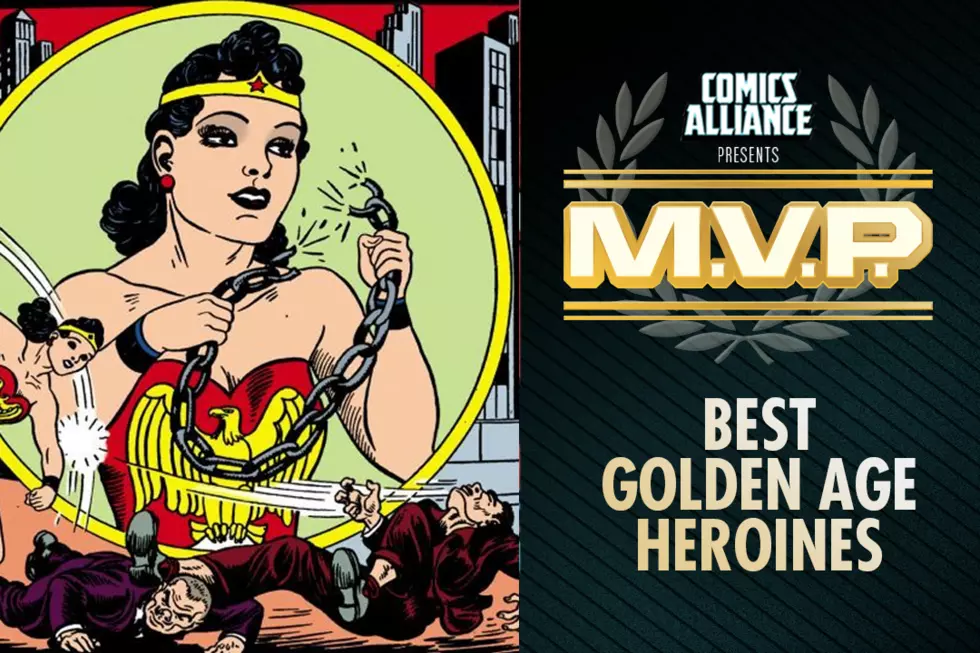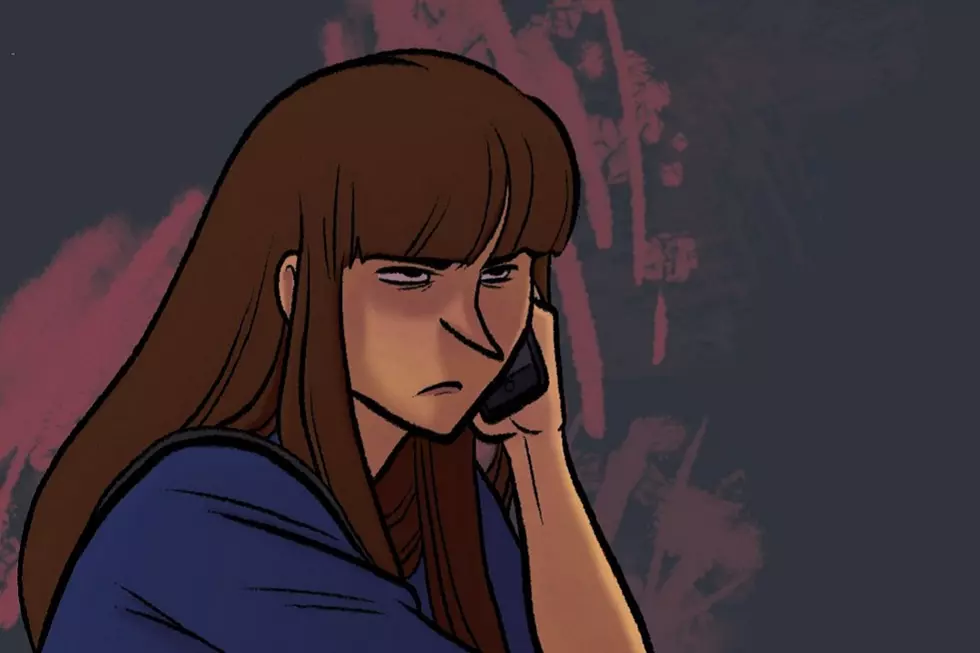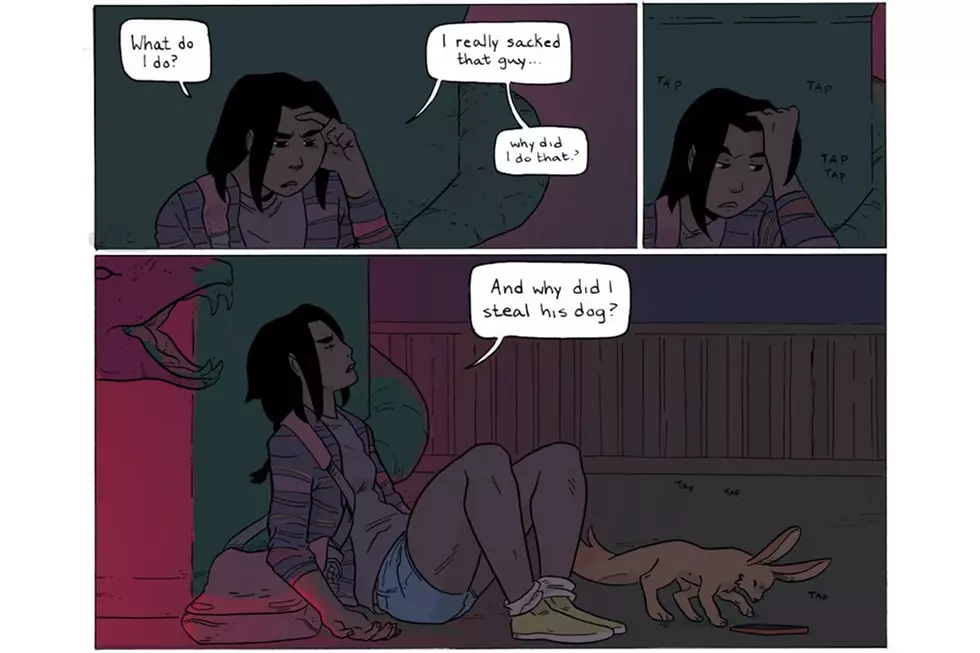![Educating and Protecting Artists: Comics Lawyer Caitlin DiMotta [Interview]](http://townsquare.media/site/622/files/2015/01/caitlin-dimotta1-630x420.jpg?w=980&q=75)
Educating and Protecting Artists: Comics Lawyer Caitlin DiMotta [Interview]
Interviews, panel appearances, fan mail — artists and writers understandably get much of the focus when we talk about professionals in the American comics industry. But beyond the front lines there’s a whole host of people working hard to keep the business running: accountants, lawyers, publicists, librarians, production staff and many others. Most of these people don’t have the opportunity to talk about their work with the people who read the comics they help put in their hands, but the work they do is important — often integral — to this industry. Whether it’s making sure creators get paid, designing logos, or even planning a convention, these people affect how the whole package of our industry comes together.
Caitlin DiMotta goes by @ComicsLawyer on Twitter and she is exactly that. As an attorney and partner at Impact Law Group, she works with many comics creators as their lawyer. Her clients include Kelly Sue DeConnick, Ed Brubaker, Rick Remender, Chip Zdarsky, and Jeff Lemire. Her top priorities are protecting the rights of artists and educating them about their legal rights. ComicsAlliance sat down with her to learn more about the work she does.
ComicsAlliance: Where are you from originally?
Caitlin DiMotta: I was born and raised in Lompoc, California. When I was nine my family moved to Boise, Idaho. I lived in Boise until about 15, when I went to Interlochen Arts Academy (a performing arts boarding school in Michigan) as a ballet major. After graduation from Interlochen, and a small detour abroad, I went to Chicago to dance professionally. I am kind of a gypsy, I guess, but honestly I feel like I grew up the most in Chicago - it was the first time I had to pay rent, buy furniture. 17-year-old me didn't know that you couldn't just walk into an apartment and turn on lights....you had to call someone and pay them before that could happen. So, I think of Chicago as the birthplace of me. Fondly, of course.
CA: You went to Columbia College for your undergrad - a school I know is pretty focused on arts and entertainment and things like that. What did you study there?
CDM: Columbia was a great school and so much fun for someone like me. Practically, what drew me to Columbia was that I could take classes at night and on the weekends - I was dancing professionally at the time, so if I wanted to get a college degree, it had to happen at night. I spent my whole life until then focused on ballet, and had little time for anything else. Interlochen was extremely challenging academically and I was always a good student, but my priority was ballet. I preferred science and math to anything else, but I never had the opportunity to explore until Columbia. I was a "Self-Directed Major" at Columbia and took every science and math class possible. I also took things that felt exotic to me like Public Relations (ooh!) and Introduction to Fashion Business (aah!). I don't think I could've enjoyed college more.
CA: What made you decide to attend law school?
CDM: A convergence of things, really. In the early 2000's I helped a couple of dance colleagues found a company called Impetus Dance Theater - they wanted me to dance for them, and because I wanted this company to succeed, I offered to assist them in establishing the company as a tax exempt nonprofit. Well, three months and several visits to the Chicago chapter of Volunteer Lawyers for the Arts, I filed the paperwork and got us approved. But it took me three months! That seemed exceeding ridiculous: I spent my entire life getting elite arts education, but not once had anyone taught us anything about the business of our art. I knew how to work for other people, sure. But for myself? Not a clue. And that seemed wrong. So, when I retired from dance I decided to go to law school and learn how to help artists, like me, with the business of their industry.
CA: Did you have a particular focus when you were attending law school? If so, what was it?
CDM: Nope, law school doesn't really let anyone do that. You take pretty much the same curriculum no matter where you go. But by the second half of your second year, you can start to pick and choose electives. My electives were always about business and contracts and art.
CA: Do you feel like your degrees prepared you for the career you've had?
CDM: Yes and no: I feel like my career as a professional ballet dancer, which began around 13, prepared me for my life as a lawyer like nothing else could. The discipline I learned as a dancer was crucial to surviving and thriving in law school, passing multiple bar exams, and managing the stress of being in charge of other people's lives. But my degrees? No. You can have any kind of degree and then become a good lawyer. All you need is discipline.
CA: What was your first job as a lawyer?
CDM: Very very first was as a criminal defense and civil rights lawyer in Albuquerque, New Mexico. Picture Better Call Saul. Everyone must start somewhere and you can only choose from the jobs that are available. That lasted only three or four months, maybe, until I walked into a prison conference cell to meet with a gang banger client and he asked "hey! Is it my birthday? Who sent you?" After informing him that I was not a stripper, but was in fact his lawyer, I decided that I needed to get back on track. After that, I got a job at a wonderful law firm in Santa Fe doing contracts of all kinds and I was much much happier.
CA: Did you know while you were becoming a lawyer that you wanted to work with the comics community? How did you end up in the industry?
CDM: No, I didn't. This practice grew very naturally from what I was doing, and the way my life was changing with my husband's career as a writer. As for the genesis of my comics practice, I give most of the credit to Ed Brubaker. When my husband, Duffy Boudreau, and I moved to Seattle in 2008, a mutual friend introduced us to Ed. As the years went by, Ed and I would talk endlessly about legal issues in the comics industry. Plus, Duffy's comic, BlackAcre, got green lit at Image so I had a front seat to that process. Because of these experiences, when I decided to return to private practice in 2010, comics seemed like a natural focus. I made it my business to understand the people, the publishers, the ins and outs of making a comic, everything I could to help be a better advisor to my clients. I could not have made a better choice in practice areas. It has been really fun.
CA: I assume, since you have made this at least a part of where you’ve focused your career, working with comics pros is appealing to you. What is it that you enjoy about the work?
CDM: I truly enjoy being a part of my clients' team. I like to think I take on the infrastructure role of building a comic, and help de-mystify the business part for everyone involved. Also, I love that I get to see my client's work in the world more consistently than I would if I were simply working in the film or TV industry. You can go for years there without ever seeing a client's story get made. In comics, it is a weekly occurrence.
Plus, with Duffy being a member of this industry, I know first-hand what it is like to work in comics. I know how a book is built from the ground up, every single step. I think that makes me a better lawyer to comics people.
CA: You work at a law firm that covers a lot of different kinds of businesses and law practice. What do they think of your comics focus?
CDM: They think it is great, the art, the titles, the comps. And I think a few have even started buying comics on their own because of it. One of my partners gave [Matt] Fraction and Zdarsky's Just The Tips to his wife for her birthday. I think that's pretty hilarious.
CA: You also work with clients in other industries. Are there any things you’ve learned there that you think the comics business would do well to learn?
CDM: That is a great question. I think comics folk could stand to be less embarrassed about talking to each other about money and planning for success. And I don't mean gossiping about page rates. I mean talking about the real financial costs and risks associated with making comics. Most businesses are started between friends, comics is not alone in this. But in other industries people are way more accustomed to legal planning and making sure everyone involved knows the contributions of every other party. In other industries, hand-shake deals are seen as terribly risky and tend to make a business very vulnerable to negative third-party exploitation; in comics, hand-shake deals are a common occurrence. And, sadly, so is negative third-party exploitation. I want to change that.
Comics people get really shy about money but also indignant that their contribution is seen as important and valuable. Everyone feels this way. I really try to help my clients build transparent relationships with their co-creators and help everyone understand everyone else's role as important.
CA: What sort of services do you offer to people in the comics industry?
CDM: For creator-owned projects, I can negotiate on behalf of the project with publishers, and build, draft, and structure all the agreements and contracts between all the creators on the book. For my clients' work-for-hire gigs, I can help them understand the publisher's contract, negotiate changes where appropriate, and assist with the relationship with the publisher. I can also help creators with merchandising contracts, options/rights purchase agreements related to media rights, and registering their work with the U.S. Copyright Office. That's a good nutshell. But most of my clients come to me with all sorts of things, and I do my best to assist to the best of my ability.
CA: What’s a day at work like for you?
CDM: Emails, phone calls, drafting contracts, reading contracts someone else drafted, chasing people down for signatures, emails, emails, looking at beautiful art.
CA: You negotiate contracts for your clients at various publishers, including foreign licensing deals. Is there anything you wish creators in general knew about the negotiation process?
CDM: Yes. If you wish to involve a lawyer in your negotiation process, do not say yes to anything without speaking to your lawyer first. And that advice is not so we can be a huge pain in the ass to the publisher later on. It is so we can protect your right to walk away if you need to, and to protect the parts of the deal that are most important to you.
Also, negotiation is a conversation, not a fight. If you are negotiating with a publisher and they don't like a term you propose, they will counter with a new term, not reject the whole deal outright. If they do walk away, you're better off never doing business with a company that emotional. Bottom line: don't be afraid to ask for what you need, but, for Pete's sake, don't say yes until you talk to your lawyer first.
CA: Is there anything you wish the comics industry knew about the work you do that may not be common knowledge?
CDM: Lawyers don't always have to be a dude with a cigar who bills by the hour. There are all types of lawyers out there, and all types of relationships between lawyers and clients. If you think you need an attorney, don't let that old caricature scare you off.
More From ComicsAlliance
![When Everything Is Pink, Nothing Is Pink: Sarah Stern On Color And Creativity [Interview]](http://townsquare.media/site/622/files/2017/03/Cindersong-feat.jpg?w=980&q=75)








